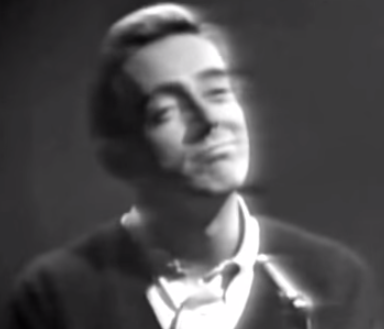Rod McKuen died a few days ago. Because I have spent a lot of time in thrift stores, I feel like I know him well, since that's where lots of his poetry books (Listen to the Warm, Lonesome Cities, etc.) have ended up, alongside the works of kindred spirits Walter and Margaret Keane. His albums, sometimes featuring his singing but generally he just recites his poetry over light-orchestral music, can be found there too. I like "The Flower People": "I like people with flowers. Because they are trying."
Artists like McKuen and the Keanes, who achieved unprecedented levels of success with the mass-market audience in the 1960s while being derided by critics for peddling "sentimental" maudlin kitsch, fascinate me — probably a hangover from graduate school, when I spent a lot of time studying the 18th century vogue for "sensibility" novels, which were similarly saturated with ostentatious tears. McKuen has a lot in common with the 18th century "man of feeling" epitomized by the narrator of Sterne's A Sentimental Journey, who travels around seeing suffering and "having feelings," which prove his humanity and allow readers to experience their own humanity vicariously. McKuen let his audience accomplish something similar with his tales of urban love and loneliness and his wistful recollections of weather and whatnot.
Still, I wonder why the market for McKuen and the Keanes re-emerged just then, in the 1960s? What made reified desolation a sudden hot commodity? Did it have to do with changes in available media, or the general air of postwar prosperity? And what's the relation between their success and their reputation? Why is that kind of critical contempt they received reserved for artists who commercialize sadness and feelings of loneliness and vulnerability? What did audiences want from their work, such that critics could seize upon it to mock it and make themselves and their readers feel superior to it all?
The New York Times obit of McKuen concludes with a quote from him in which he claims that success turned critical opinion against him:
“I only know this,” Mr. McKuen told The Chronicle in 2002. “Before the books were successful, whether it was Newsweek or Time or The Saturday Evening Post, the reviews were always raves.”
I wonder if McKuen thought that only his popularity kept him from earning the respect that, say, Leonard Cohen or Jacques Brel (whose songs McKuen translated into English-language hits) or maybe even Wordsworth and Whitman tend to get. But such counterfactuals seem beside the point, not only because critical opinion is fickle and ever-changing but because it is impossible to separate the "quality" of a work from the conditions surrounding its reception.
Participating in the phenomenon of McKuen's popularity (or conspicuously refusing) became essentially what his work was about, beyond the melancholy remembrances about lost lovers and cities at dusk. You were either on board and willing to conform, willing to let McKuen be the way you defused potent and inescapable fears about decay, sadness, anonymity, and fading love along with millions of others and thereby mastered those feelings, put them in a safe place to be admired, or you were not on board, unwilling to conform, unwilling to admit those feelings could be collectively tamed but instead must be personal demons you never stop fighting alone, far more alone than any McKuen poem could ever testify to.
One might be tempted to champion McKuen as a populist who rendered the ordinary person's feelings and aspirations in easily digested metaphors while the culture snobs sneered. But if you listen to a lot of his music or read through his books, you might end up with the sense that his point of view has more to do with snobs than ordinary people: He seems to travel a lot from glamorous seaside city to glamorous city, indulging in late-night bouts of boozy nostalgic melancholy with little fear of economic want, issuing patronizing advice about how to feel to readers or listeners or discarded lovers or total strangers, luxuriating in emotions as if they were badges of privilege rather than the afflictions he would otherwise have you believe. (Listen to "Earthquake," for instance.) McKuen sounds like a humble-bragger whose medium is misery; his sadness makes him more important and individuated than less sensitive or self-regarding souls.
I wonder if, when McKuen was popular, critics felt threatened not by his work's "sentimentality" but its familiarity, which they then labeled "vulgarity" to try to expunge it from their own sensibility. I know that is how I feel when I listen to his music. It sounds smug to me because I've felt those smug feelings and romanticized them privately (lacking the courage or the chutzpah to try to cash in on them). I can't hear his poems as straightforwardly earnest, like perhaps the millions of people who bought in could. I implicate myself in these works instead, in every self-satisfied line of self-deprecation and self-pity. I recognize someone who wants to feel different from everyone else but still wants them all to feel sorry for him.
McKuen went more or less underground of his own volition in the early 1980s, which perhaps could be seen as a kind of admission of guilt. His obituaries describe him in his reclusion as severely depressed, holed up in his California home with half a million records and CDs. It's an emblematic tableau that stands as a warning. You can retreat to the mountain with your carefully curated collection of records that prompt you to have all those important feelings that you can't bear to experience through or with other people, but that's not going to let you understand what all those people felt when they bought a Rod McKuen record in the 1960s and maybe even played it once or twice.
